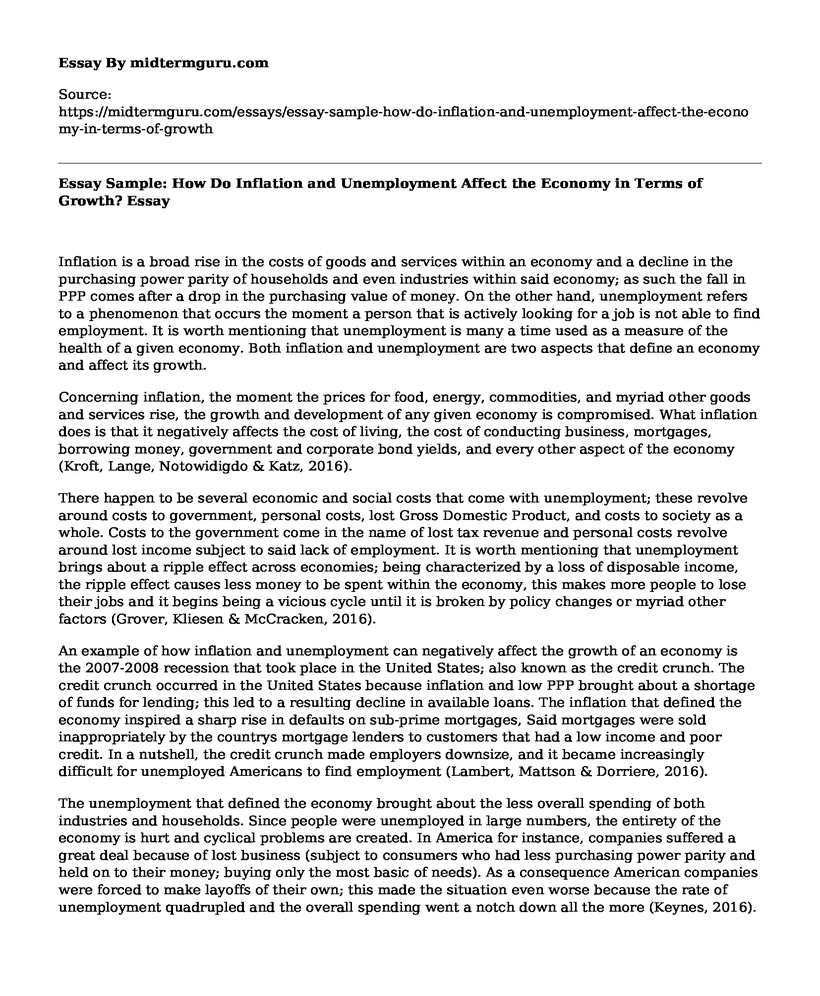Inflation is a broad rise in the costs of goods and services within an economy and a decline in the purchasing power parity of households and even industries within said economy; as such the fall in PPP comes after a drop in the purchasing value of money. On the other hand, unemployment refers to a phenomenon that occurs the moment a person that is actively looking for a job is not able to find employment. It is worth mentioning that unemployment is many a time used as a measure of the health of a given economy. Both inflation and unemployment are two aspects that define an economy and affect its growth.
Concerning inflation, the moment the prices for food, energy, commodities, and myriad other goods and services rise, the growth and development of any given economy is compromised. What inflation does is that it negatively affects the cost of living, the cost of conducting business, mortgages, borrowing money, government and corporate bond yields, and every other aspect of the economy (Kroft, Lange, Notowidigdo & Katz, 2016).
There happen to be several economic and social costs that come with unemployment; these revolve around costs to government, personal costs, lost Gross Domestic Product, and costs to society as a whole. Costs to the government come in the name of lost tax revenue and personal costs revolve around lost income subject to said lack of employment. It is worth mentioning that unemployment brings about a ripple effect across economies; being characterized by a loss of disposable income, the ripple effect causes less money to be spent within the economy, this makes more people to lose their jobs and it begins being a vicious cycle until it is broken by policy changes or myriad other factors (Grover, Kliesen & McCracken, 2016).
An example of how inflation and unemployment can negatively affect the growth of an economy is the 2007-2008 recession that took place in the United States; also known as the credit crunch. The credit crunch occurred in the United States because inflation and low PPP brought about a shortage of funds for lending; this led to a resulting decline in available loans. The inflation that defined the economy inspired a sharp rise in defaults on sub-prime mortgages, Said mortgages were sold inappropriately by the countrys mortgage lenders to customers that had a low income and poor credit. In a nutshell, the credit crunch made employers downsize, and it became increasingly difficult for unemployed Americans to find employment (Lambert, Mattson & Dorriere, 2016).
The unemployment that defined the economy brought about the less overall spending of both industries and households. Since people were unemployed in large numbers, the entirety of the economy is hurt and cyclical problems are created. In America for instance, companies suffered a great deal because of lost business (subject to consumers who had less purchasing power parity and held on to their money; buying only the most basic of needs). As a consequence American companies were forced to make layoffs of their own; this made the situation even worse because the rate of unemployment quadrupled and the overall spending went a notch down all the more (Keynes, 2016).
In summary, inflation and unemployment are the banes of any one given the economy, and concerned governments should always see to it that the prices of goods and services within their economies are kept in check. Control can only be garnered using expansionary and contractionary policies.
References
Grover, S., Kliesen, K. L., & McCracken, M. W. (2016). A Macroeconomic News Index for Constructing Nowcasts of US Real Gross Domestic Product Growth.Keynes, J. M. (2016). The general theory of employment, interest, and money. Atlantic Publishers & Dist.Kroft, K., Lange, F., Notowidigdo, M. J., & Katz, L. F. (2016). Long-term unemployment and the great recession: the role of composition, duration dependence, and nonparticipation. Journal of Labor Economics, 34(S1), S7-S54.Lambert, T., Mattson, G., & Dorriere, K. (2016). Industry Clustering and Unemployment in US Regions: An Exploratory Note.
Cite this page
Essay Sample: How Do Inflation and Unemployment Affect the Economy in Terms of Growth?. (2021, Jul 02). Retrieved from https://midtermguru.com/essays/essay-sample-how-do-inflation-and-unemployment-affect-the-economy-in-terms-of-growth
If you are the original author of this essay and no longer wish to have it published on the midtermguru.com website, please click below to request its removal:
- Equal Employment Opportunity Commission v Interstate Distributor Company
- Overcoming Addictions Using Culture: Case of Alkali Lake, BC
- Workplace Violence - Essay Example
- Essay Sample on LGBT Workplace Diversity
- Two Causes of Racism - Essay Sample
- Pedophilia & Cognitive Impairment: Examining Neurodevelopmental Correlates - Essay Sample
- Addiction: A Disease or Not? - Essay Sample







